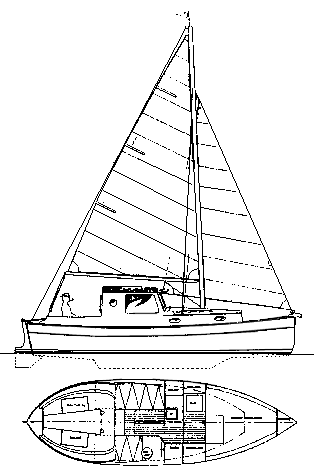The Nimble 25 Arctic, sometimes referred to simply as the Nimble 25, stands out as a versatile and distinctive American trailerable sailboat. Designed by the renowned naval architect Ted Brewer, this model was conceived as a capable cruiser, balancing comfortable accommodations with practical performance for coastal voyaging and overnight excursions. Built by Nimble Boats Works Inc. of Florida, the Arctic embodies the builder's ethos of thoughtful design and functional craftsmanship, appealing to sailors seeking a vessel that is both characterful and highly adaptable.
Nimble 25 Arctic Information, Review, Specs

- Make
- Nimble
- Model
- 25 Arctic
- Number Built
- Production Year(s)
- 1988 - 1993
The Nimble 25 Arctic was in production from 1988 to 1993, emerging from the innovative spirit of Nimble Boats Works Inc., founded by Jerry Koch in Clearwater, Florida. Ted Brewer, a prolific designer known for his work with Nimble Boats, lent his expertise to the Arctic, aiming to create a vessel that offered cruising accommodations within a compact, easily handled, and trailerable package. The design priorities for the Nimble 25 Arctic included maximizing comfort in a boat under 30 feet, ensuring it could be easily towed behind a suitable vehicle, and featuring a sail plan that was simple to manage. This design approach often resulted in vessels that blurred the lines between sailboats and powerboats, leading to the "motorsailer" designation for models like the Arctic. Nimble Boats' commitment to robust fiberglass construction contributed significantly to the durability and longevity of these vessels. The Nimble 25 Arctic was offered with a fractional sloop rig but was also available as a yawl. Furthermore, the boat featured a highly versatile keel arrangement, with a centerboard allowing for a minimum draft of 1.33 feet, which could be extended to a maximum draft of 4.17 feet. A fixed keel version with a draft of 2.5 feet was also available.
Sailing Performance and Handling
The Nimble 25 Arctic exhibits performance characteristics well-suited for its cruising role. With a sail area to displacement ratio of approximately 18.93, she is designed to perform capably in lighter air conditions, making her responsive even in gentle breezes. Her ballast to displacement ratio of around 0.34, while on the lower side for stiffness, suggests a comfortable motion in a seaway, potentially being initially tender but settling in nicely once heeled. The displacement to length ratio, calculated at approximately 91.69, indicates a relatively light displacement for her waterline length of 24.17 feet. This combination contributes to an efficient hull form capable of achieving a theoretical hull speed of 6.59 knots. Anecdotal accounts from owners highlight the Nimble 25 Arctic as a "very stable" boat that can handle "just about any weather," emphasizing its robustness as a cruiser rather than a pure racer. The fractional rig is noted for simplifying tacking, a benefit for cruisers.
Accommodations and Layout
While modest in size with a length overall of 26.0 feet and a beam of 8.25 feet, the Nimble 25 Arctic was designed with a focus on maximizing interior volume for comfortable cruising. The cabin is described as "very comfortable," capable of accommodating overnight cruises. The typical interior arrangement provides sleeping accommodations for four people, featuring a double V-berth in the forward cabin and two straight settees in the main salon. Although specific details on interior finish materials are not widely documented, the builder's reputation for excellent "attention to detail" suggests a well-appointed interior for its class. The emphasis on cruising accommodations within its under-30-foot length reflects a design philosophy that prioritizes liveability for weekend trips or extended coastal adventures.
Owner's Perspectives
Owners of the Nimble 25 Arctic consistently praise its robust construction and thoughtful design. Key strengths frequently highlighted include its exceptional stability, providing a sense of security even in varied conditions. The retractable centerboard, with its impressive minimum draft, is a significant advantage, allowing access to shallow anchorages and facilitating easy trailerability, a primary design goal. Many owners value the comfortable cabin, which makes overnight stays and cruising genuinely enjoyable. Furthermore, the "attention to detail" in the boat's construction is often noted, and Nimble boats generally hold their value well in the used market, a testament to their enduring appeal and build quality. While Nimble boats are older vessels given their production years, their owners tend to be highly committed, often forming active communities that share a passion for these unique and reliable cruisers.
Measurements
Construction & Hull
- Construction Material
- Fiberglass (Solid)
- Hull Type
- Monohull Sailboat
- Keel Type
- Centerboard
- Rudder
- 1x —
- Ballast
- 1000 lbs
- Displacement
- 2900 lbs
- Water Capacity
- -
- Fuel Capacity
- -
Engine
- Engine Make
- —
- Engine Model
- —
- Engine Type
- —
- Engine HP
- —
- Engine Count
- 1
- Drive Type
- —
- Fuel Type
- —
Rig & Sails
- Rig Type
- Fractional Sloop
- P (Main Luff)
- -
- E (Main Foot)
- -
- I (Foretriangle Height)
- -
- J (Foretriangle Base)
- -
- Forestay Length (est)
- -
- Main Sail Area
- -
- Foretriangle Sail Area
- -
- Total Sail Area (Reported)
- 240 sqft
- Total Sail Area (Calc)
- -
Dimensions
- LOA
- 26 ft
- LWL
- 24.17 ft
- Beam
- 8.25 ft
- Draft
- 4.17 ft
- Max Headroom
- -
- Air Draft
- -
Calculations
- Hull Speed
- 6.59 kn
- Pounds per Inch Immersion
- 712.49